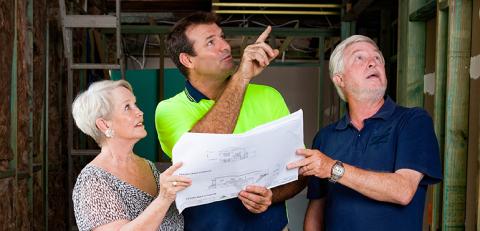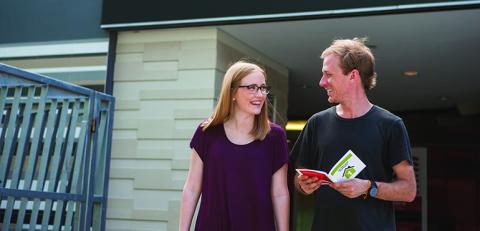
- Home
- Home owner hub
- Options for building or renovating
Options for building or renovating
Whether you’re thinking of taking on a project yourself, or leaving it all up to the professionals, there is a lot of choice when it comes to building.
It’s a good idea to do some research before you decide. You may find that your original plans change as you discover some alternatives.
For example, if you want to build a house but there are budget constraints, is renovating your existing house an option? Or maybe building a ready-made project home is the answer if you’re time-poor.
The section below may provide some guidance and help you decide.
Individually designed homes
This is where the plans are drawn for you by a building designer, architect or engineer.
Pros
| Cons
|
Project or display homes
You choose a project home from a selection of standard plans, usually covering a wide range of prices, styles, sizes, specifications and standards of fittings and inclusions. You can build on an existing block of land, or buy a house and land package from a developer.
Pros
| Cons
|
Renovations or additions
This may involve extending or restructuring your existing home.
Pros
| Cons
|
Kit/pre-fabricated homes
You can find information on kit homes at the Office of Fair Trading.
Buying land
Once your budget is set, you can move on to finding land if you’re building a house. The type of land you choose will have a direct effect on the type of construction.
Land factors to consider include:
- size/slope/soil type (will vary costs on footing systems)
- aspect (direction of sun/prevailing breezes)
- setbacks/easements/zoning/height restrictions
- tree, animal habitat and heritage preservation rules
- environmental factors
- local development and facilities (especially transport, and medical, shopping and recreational facilities as well as infrastructure e.g. water supply).
The factors that will have the most impact include the size and slope of the block, and the soil type. You may find that the cost of the build will increase if your home requires stronger foundations, or needs a more complex design because the land has unique features.
What you can build will be affected by any covenants associated with the land, which may reduce your options in terms of size and design. You may also be limited by tree and animal habitat preservation rules or other environmental factors.
Remember to read your contract and talk to a solicitor before signing the contract with your builder or designer.
DIY – Owner builder
If you’re thinking of taking on a building project, you should consider a few things before you start. Although doing the job yourself can potentially save you money, do you have the skills and experience to do the work?
If not, you may need to consult or work with a builder to ensure that the work meets the current building standard, and any products are installed correctly. It’s also important to consider the costs in repairing the work if you make any mistakes.
You should also be aware of the types of building work you can’t do:
- plumbing and drainage (excluding some unregulated plumbing work)
- gasfitting
- termite management – chemical
- electrical work (contact the Electrical Safety Office for more information).
Additionally, if the market value of your project is over $11,000 (i.e. the reasonable cost of a licensed contractor to do the job), you’ll need an owner builder permit.
Another thing to take into account if you choose to owner build is not having access to the Queensland Home Warranty Scheme.


